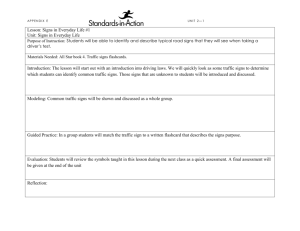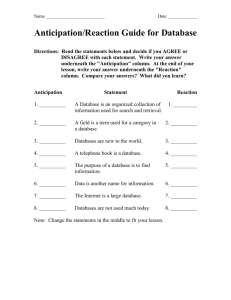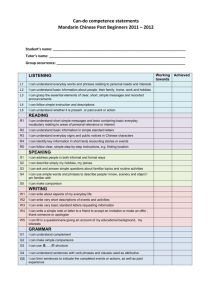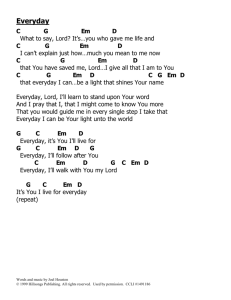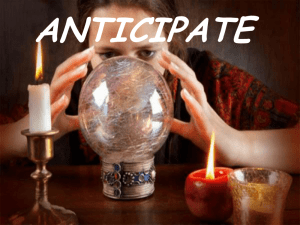Earth Day
advertisement
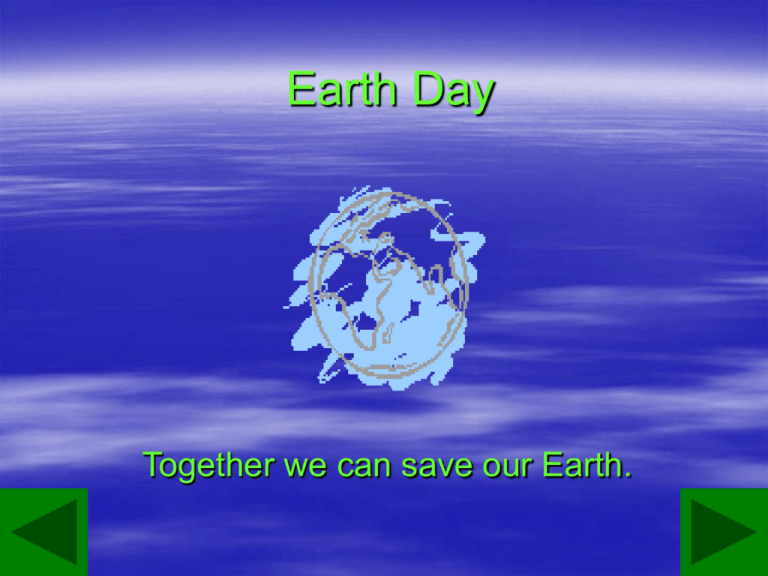
Earth Day Together we can save our Earth. Our Earth The Earth is ours to enjoy For every little girl and boy. But we must always be aware. That all its beauty we must share With all the children yet to come, Who want to laugh and play and run Around the trees and in the fields. So we must keep our planet free From messy trash and debris With air that’s clean and fresh and clear For all to breath from year to year. We must never ever abuse Our sweet Earth that’s ours to use. -Author Unknown Introduction Did you know that we need fresh air to breath and clean water to drink? Every day on this Earth people are doing things to destroy these precious gifts that our beautiful planet has given us to survive. Did you ever stop to think about what could happen if we ever lost these amazing items that are necessary for our everyday survival? Today you are going to learn about a special day that was designed to teach us how to care for our Earth and how to celebrate our Earth for all that she gives us. This day was also designed to show us that we need to take care of our planet everyday in order to protect it and all that lives on it. Materials You Will Need Earth Day by Linda Lowery Pencil Markers, Crayons, Colored Pencils White Poster Paper Access to a Smart Board with internet access. Vocabulary Anticipation Guide Science Notebook Chart Paper- for the entire class to share. (Many Pages-blank that can be recorded on throughout the lesson) Worksheets: “What can these items become?” Items for the beyond reading activity. Before Reading Lets see how much you already know about Earth Day. Before we begin to read our story we are going to talk about some words that will be a big part of our story. Some of these words we have already talked about in our Conservation Unit, while some are going to be new to you. On your desk you will find an anticipation guide that has the following words and directions on it. Anticipation Guide If you know the word that is listed, and you can define it put a check under the green column. If you think you know the word somewhat check under the yellow column, and if you don’t know what the word means at all put a check in the red column. Remember it is okay if you don’t know the word. We are going to talk about all the words listed below as we read our story. To Learn more vocabulary related to Earth Day click here.. http://www.odonel.k12.nf.ca/science/RECYCLE.GIF Pollution Environment Recycling Landfill Reduce Chemical Oxygen Senator Reuse Preserve Make a Prediction Look carefully at the cover of this story. In your Science Notebook , I want you to write about why you think Earth Day was developed. Don’t forget to take the pictures, the title, and the poem that we just read aloud into consideration when you are making a prediction. Also make sure to include the word because in your prediction, so we can know why you think what you do. When everyone is completed with their predictions we will share a few. During Reading • Listen quietly as I read pages 1- 8 aloud to you. • While I am reading, I want you to listen closely to ways that people bring harm to the Earth. Be prepared to share some of these ways when I am finished reading. During Reading In your Science Journal, name five ways that people harm the Earth. Once everyone is done listing the five ways in their journal, we will share your ideas and create a class list of ways that people harm the earth. During Reading Listen again as I read pages 8-19 aloud to you. As I read these pages, I want you to think about how Senator Nelson started Earth Day, and why he started Earth Day. Click here to find out information about Senator Nelson http://www.medaloffreedom.com/GaylordNelsonPl acque.jpg During Reading In your journal, explain why you think the first Earth Day was the largest celebration in the Earth’s History. On this first Earth Day, Name some ways that you believe Lawmakers learned to care for the Earth. Click here to learn more about the first Earth Day. During Reading • Listen as I read pages 19-29 aloud to you. During Reading http://www.sciencenews.org/articles/20010707/a713_1550.jpg Can you recall what these big holes in the ground are called that the garbage was just sitting in? In your science journal, explain why some of the garbage would be there forever. Click here to see how Landfills work. http://www.pca.state.mn.us/artwork/miscphotos/landfill.jpg During Reading • Listen again as I read the rest of the story aloud to you. • I want you to pay special attention to how people in America and all over the world started to take care of the Earth on a regular basis. After Reading Now that we have completed reading our story about Earth Day, I want you to return to your Anticipation Guide. Using a colored pencil, if you now know a word, and can define it, put a check under the green sign, if you still are somewhat unsure of what a word is or what it means put a check under yellow, and if you still don’t know what a word is or what it means put a check under red. http://www.lenntech.com/images/recycle.gif Everyday is Earth Day Everyday is Earth Day, If it’ s not cold or wet or hot Pitch in to save the planet It’s the only one we’ve got. -Author Unknown After Reading HOW CAN YOU MAKE EVERDAY AN EARTH DAY? With a partner you are going to create a poster that shows at least five ways that you can make everyday and Earth Day and help save our planet Earth. Before you begin to create, we are going to design a large class list displaying ideas of how we can make everyday an Earth Day. As we begin our list, I want you to think carefully about ways our story mentioned that we can help to save our planet and make everyday an Earth Day. Beyond Reading Activity I am now going to pass out a worksheet to each of you upside down. When I say it is okay you may turn it over. On the top of each worksheet, you will find common garbage items that may be reused. Many of these items were mentioned in our story. Your task is going to be to list as many ways to reuse this item as possible on the worksheet. Beyond Reading Activity On the board you will find charts that match the ones that are on your desk. Each of you is going to come up to the board one at a time, and put your new items onto the chart that matches your item. If you already see one of your items on the list, you don’t need to repeat it, just put the ones that you have that aren’t on the list.. CREDITS Websites: http://www.recyclezone.org.uk/iz_wastewords.aspx http://ldnr.wi/gov/org/caer/ce/eek/nature/gaylord.htm www.google.com http://www.kidsdomain.com/holdiay/earthday/history.html http://www.howstuffworks.com/landfill.htm http://lenntech.com/images/recycle.gif Book: Lowery, Linda. Earth Day. Carolrhoda Books INC. Minneapolis, MN. 1991. Rubric Solid Understanding 3 Basic Understanding 2 Needs Improvement 1 Before Reading Activities The student completed the anticipation guide and developed a well thought out prediction that included details from the pictures, the title, and the poem that was part of the pre reading activity. The prediction was supported using the word because and with details The student attempted, but was not able to complete all of the anticipation guide. The student developed a prediction that included some details from the pictures, the title or the poem, however the prediction was not supported by the word because or with supporting details. Student completed very little of the anticipation guide. The student developed a prediction that included no details from the pictures, the title, or the poem, and the prediction had no support. During Reading Activities Student identified and predicted at the appropriate times based on clues from the text, and/or prior knowledge. Understanding of all concepts was demonstrated through class discussions and journal entries in a meaningful way that provided significant support from the text. Contributed to all class discussions. Student identified and predicted at the appropriate times based on clues from the text, and/or prior knowledge. Understanding of most concepts was demonstrated through class discussions and journal entries in a somewhat meaningful way that provided some support from the text. Contributed to some class discussions. Student did not complete journal entries and demonstrated difficulty predicting. Did not contribute to class discussions. After Reading Activities Demonstrated learning by being able to define and discuss new words on the Anticipation Guide. Contributed a great amount to class discussion of “How We Can Make Everyday Earth Day”. Poster contained at least five ways to make everyday Earth Day, and was visually appealing. Demonstrated learning by being able to somewhat define and discuss new words on the Anticipation Guide. Contributed minimally to the class discussion of “ How We Can Make Everyday Earth Day”. Poster contained only 3-4 ways to make everyday Earth Day, and was only somewhat visually appealing. Was unable to define or discuss any new words on the Anticipation Guide. Did not contribute to class discussion at all. Poster contained less than three ways to make everyday Earth Day, and was not completed neatly.
